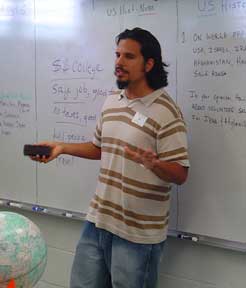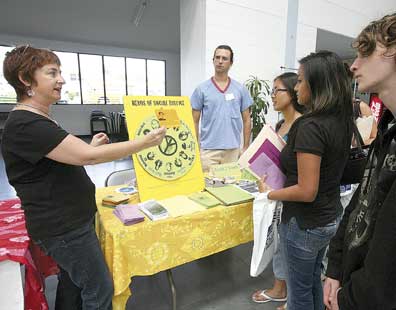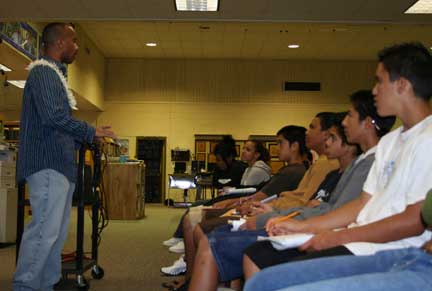
|
Muste
Notes |
||||||||||
 |
Pablo Paredes speaks with students at Konawaena High School on September 25. Photo by Gunter Monkowski |
Truth 2 Youth, founded in December 2004 in Volcano, Hawaii, received a $1,000 grant from the Muste Institute last August for Give Peace a Dance, which brings counter-recruitment outreach into high school dances and events. This article is by Truth 2 Youth coordinator Catherine Kennedy.
Pablo Paredes visited two public high schools on the Big Island of Hawaii
last September 25 and 26. Another veteran was slated to come speak at the schools
and chaperone our
first public high school dance a few days later, as well as do classroom visits
on Maui set up by Maui Peace Action. However, this vet had to cancel at a late
date because of a rough stretch of posttraumatic stress disorder (PTSD). I
emailed a desperate plea to southern California contacts. Within 12 hours (!)
I received a response from Pablo Paredes through Arlene Inouye of Coalition
Against Militarism in Our Schools.
Bronx-born Pablo Paredes was a navy petty officer and weapons-control technician who was court-martialed for refusing to deploy to the Persian Gulf in December 2004. Pablo agreed to come to Hawaii, even as he was moving from southern California to Oakland for a new job at the Central Committee for Conscientious Objectors (CCCO). The Oakland CCCO staff thought Pablo could also help the newly-forming G.I. Rights Hotline in Honolulu. So at the last minute, all three islands—Hawaii, Maui and Oahu—agreed to share the cost of Pablo’s flights.
 |
Catherine Kennedy (left) and Big Island veteran Alan Laird (behind table) engage with students at the Sanga Hall Career Fair in Hilo on March 8. Pete Shimazaki (not pictured) came from Oahu to help out; he and Alan talked to dozens of students and counselors over the course of the three-hour fair. Photo by William Ing |
Pablo spoke with 107 history students in five classrooms at Konawaena High School in the town of Captain Cook. The next day Pablo spoke to 93 students in four social studies classes at Kau Public High School in Pahala, and gave an impromptu talk in Spanish to a class of honors Spanish students. Pahala is small and isolated; it was populated primarily by sugar cane field workers and suffered mass unemployment when Dole left Hawaii in the early 1990s for non-union labor operations in the Philippines.
Pablo’s presentations are extremely interactive. After explaining about what kind of service members become recruiters, and the incentives that motivate them to keep their jobs, Pablo asks the class: “How would you evaluate if a recruiter is doing a good job?” Students answer, “By how many people he signs up.” Will he sign up a lot of people if he mentions possible death, injury, time away from family? Students answer, “NO!”
Then Pablo moves to the $4 billion recruiting budget, explaining that recruiter’s perks and salaries are just a small piece of this large pie. What are the other pieces? How else are young people recruited? The students supply the answers as he fills in the pie on the board: movies, TV, MySpace, video games, magazine ads, SCHOOLS...
 |
Jabbar Magruder talks to students at the library of Waiakea High School in Hilo in mid-February. Photo by Alan McNarie |
Why is joining the military so good? Students compile the list: money for college, benefits, travel and adventure. Discipline, fitness and patriotism were also mentioned. Pablo very calmly, kindly and credibly debunks all these myths.
Pablo then talks about a few things omitted by recruiters, like that in all wars the highest percentage of deaths are innocent civilians, and how PTSD often results in homelessness. He goes into detail about cluster bombs, and how the Pentagon admits that 5% of the deadly pellets do not explode as they are meant to. To emphasize how these pellets later kill children who think they are colorful tennis balls, Pablo throws the chalk in his hand to the closest student. It’s very effective. By this point the room is usually very quiet. He asks, “So what do you think, do you think this is important information to know before you sign?” Every kid raised their hand when he asked this.
Pablo couldn’t stay to chaperone the “Give Peace a Dance” event at Pahoa High School on September 29, but we were lucky to have Pete Shimazaki Doktor come from Oahu. Pete, the son of a German Jewish Marine and an Okinawan “war bride,” was misled by a deceitful army recruiter into enlisting right out high school as a combat medic. He completed active duty, but as a reservist during the first Gulf War, his questions led him to evolve into a peace activist and community organizer. Pete is now a volunteer counselor for the GI Rights Hotline-Hawai’i, a member of Veterans for Peace-O’ahu Chapter 113, and a substitute teacher. He is very outgoing and warm, with a good sense of humor.
Before the dance, Pete spoke to an English class at Pahoa, telling them: “I am talking to you because I WISH I had had someone who talked to me before I enlisted.” He colorfully described being bullied into enlistment by two big older recruiters when he was 17 years old and uncertain about his future. He did imitations of them each shouting at him at very close range from either side. His casual approach got the kids very comfortable and animated. They started telling him about recruiters calling and talking to them “like they were friends.”
Since Pete teaches high school students on Oahu, he knows what these kids hear from their parents, and what social pressures they face. Hawaii is a unique environment. The military is perceived as absolutely vital to the economy. Hawaii still had a plantation system of economy and labor well into the 20th century. People who were “taken care of” by the plantation system view the military in a similar fashion. Criticism of such a big provider is still seen as very much taboo and against one’s self interest, even risky.
From February 12 through 14, Jabbar Magruder from Iraq Veterans Against the War in Los Angeles came and spoke at four high schools and one after-school program on the Big Island. Jabbar is a 24-year old veteran of the California National Guard who was in Iraq for 11 months working as a Blackhawk helicopter mechanic. He is now in a pre-med program but could be redeployed as soon as 2008. Jabbar recently took part in the Appeal for Redress, a message signed by thousands of active-duty military to their Congressional representatives, asking for an end to the occupation of Iraq.
Jabbar had never been so “up close” to high school students, hearing their stories and perceptions. Until this visit he had mostly spoken at large assemblies or to college audiences. In each presentation Jabbar used the 14-minute DVD “Before You Enlist,” stopping it at various points to ask the students questions. At Kealakehe, a large, crowded school with a JROTC program, the students asked Jabbar: Did he get paid overtime for working 12 hour days, on 10-day rotations? They were shocked that he didn’t. At Waiakea High School, the students asked: “Why haven’t we heard any of this stuff before?” We told them, “Because you are the target audience of an extremely well funded, aggressive media campaign to make military enlistment look great.” One example: all the library computer mousepads were complimentary military ad mousepads!
At Laupahoehoe School, a small neglected rural school in a town that also collapsed after sugar left, the kids kept Jabbar there for 40 minutes after the bell, asking questions. Many of the teachers came and talked to us. Jabbar also spoke at the Hawaii Academy of Arts & Sciences, a charter school in the Puna district.
During this school year we have managed to have veterans speak to more than 600 students at nine of the ten public schools on the Big Island, one of the five charter schools, one after-school program and the career fair. In each school this was the first time students were exposed to a point of view about the military from someone other than school staff or military recruiters. It also marked a great beginning to inter-island collaboration on counter-recruitment work.
-Catherine Kennedy
Counter-Recruitment Grants, April 2007
The Muste Institute’s Counter Recruitment Fund makes small grants to groups engaged in nonviolent education and action for social justice. Our next deadline for proposals is July 20, 2007. Guidelines are on our website at www.ajmuste.org/counter-recruit.htm.
Coalition for Peace Action (Princeton, NJ):
$1,000 for a joint project with the Coalition for Peace and Justice of Linwood,
New Jersey, distributing information on military recruitment practices
to middle and high school teachers at the New Jersey Education Association
Annual Conference in November 2007. http://www.peacecoalition.org/
New York Collective of Radical Educators-NYCoRE (New York, NY):
$1,500 for printing and distribution of the curricular resource guide “Camouflaged:
An investigation into how the U.S. military affects you and your community.” www.nycore.org
Syracuse Peace Council (Syracuse, NY):
$1,500 for the Nonviolent Futures Initiative of the Military Alternatives Education
Project, providing information within heavily recruited constituencies about
the tactics of military recruiters, the truth about life in the military,
and job training, college funding and career alternatives. www.peacecouncil.net/MAEP
Lamar Hoover, a longtime peace activist, journalist and publisher, fair trade organizer and former associate of A.J. Muste, died on January 6 at the age of 84. Hoover lived in Ojai, California with his wife, Sally, who survives him. Lamar was managing editor and later an editorial staff member at Liberation Magazine from March 1967, right after A.J. died, through June 1970. During this period, Lamar also became a tax resister to protest the Vietnam War and militarism in general.
After moving to California in 1979, Lamar became publisher of Times Change Press, producing books on social change and peace. He also helped found a group called Tercer Mundo which distributed fair trade crafts and foods from Latin America and Africa. Lamar and Sally have been regular and generous supporters of the Muste Institute for many years.
– Murray Rosenblith
AYPAL TRAC
Oakland, CA: $2,000
The Asian/Pacific Islander Youth Promoting Advocacy & Leadership Talking
Root Art Collective (AYPALTRAC) was founded in 1998 as a community collaborative
of seven organizations serving Asian, Southeast Asian and Pacific Islander youth
in Oakland. This grant goes for HIP HOP TONGA: Reconnecting Roots & Resistance,
bringing together Tongan youth in East Oakland to express their traditions and
experiences while educating themselves and others around social issues.
COALITION FOR PRISONERS’ RIGHTS/PRISON
PROJECT OF SANTA FE
Santa Fe, NM: $2,000
Coalition for Prisoners’ Rights has been working since 1976 to
disseminate information, analysis and action to those who are imprisoned
or formerly imprisoned, and their loved ones and allies. This grant goes
for an outreach campaign to promote the Coalition’s monthly newsletter,
now in its 32nd year, as an organizing and community-building tool for
prisoners and supporters.
FUNDACIÓN ARTE Y CULTURA DEL PACÍFICO
Bogotá, Colombia: $1,500
Foundation for Art and Culture of the Pacific Region (FUNDARTECP) was
founded in 1997 by Daira Quiñones, an Afro-Colombian activist
from the southern Pacific coast town of Tumaco. Political violence has
forced many Colombians—including Daira and her three children—to
seek refuge in the capital. This grant goes for workshops with
these displaced communities to strengthen their peaceful grassroots resistance
against ongoing physical and cultural violence.
LABOR’S VOICES 3
New York, NY: $1,500
This grant went for the “Labor’s Voices 3: Media for a New
Workers Movement” conference held April 26-28 in New York City.
The conference brought together immigrant and independent media makers
with unions and workers centers to network and strengthen organizing. http://laborsvoices.org/
LIFE OR LIBERTY
Brooklyn, NY: $2,000
Filmmaker and activist Konrad Aderer founded Life or Liberty in 2002
to build awareness around the unjust treatment of immigrants in the U.S.
since September 11, 2001. This grant goes for “Enemy Alien,” a
documentary about the two-year struggle for the release from immigration
detention of New York City-based Palestinian activist and radio producer
Farouk Abdel-Muhti. http://www.lifeorliberty.org/
NATIONAL ENVIRONMENT AND EDUCATION DEVELOPMENT (NEED)
Tamil Nadu, India: $2,000
NEED has been working with dalit (“untouchable” caste) communities
in the Pudukottai district of Tamil Nadu since 1994. This grant goes
for rights-based trainings for dalit volunteers who will use folk media
and small group meetings to help their communities collectively develop
grassroots leadership and organize against caste and gender
discrimination.
STUDENT/FARMWORKER ALLIANCE
Immokalee, FL: $2,000
Since 2001, the Student/Farmworker Alliance (SFA) has worked with the
Coalition of Immokalee Workers, a farm-worker group in Florida, to organize
broad campus support for fair treatment of agricultural laborers. This
past April, the two groups won a major victory when McDonald’s
agreed to meet the wage demands of workers who pick Florida tomatoes.
The next target is Burger King. This grant goes for SFA’s third
annual “encuentro,” a gathering of young organizers from
around the country in September 2007 to develop analysis and strategize
on campaigns. http://www.sfalliance.org/
LAND, RAIN AND FIRE: REPORT FROM OAXACA
Brooklyn, NY: $1,500
This grant goes toward a creative grassroots outreach and distribution
campaign for a
30-minute documentary film about the ongoing social uprising and government
crackdown in the southern Mexican state of Oaxaca. The film seeks to
build solidarity with the grassroots people’s movement in
Oaxaca and raise awareness about the impact in Mexico of U.S. intervention
and globalization. http://www.andersongoldfilms.com/
| The A.J. Muste Memorial Institute makes small grants to groups engaged in nonviolent education and action for social justice. Our next deadlines to our regular grant program and to our Counter Recruitment grant program is July 20, 2007 Guidelines are at http://ajmuste.org/guidelin.htm |